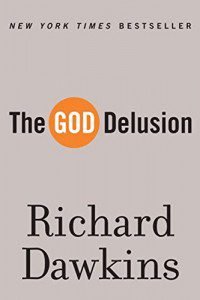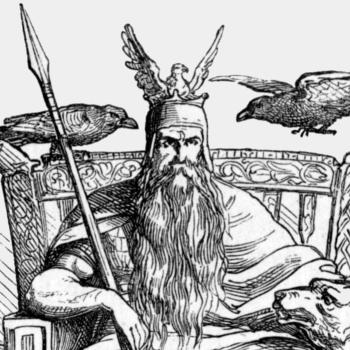Richard Dawkins, The God Delusion
(Mariner Books; Reprint edition 2008)
★★★ Read of the Month! ★★★
Followers of Patheos Nonreligious, and indeed social media in general, will be aware that atheist posterboy Richard Dawkins is back in the news again; this time for having one of his events cancelled. The reason? For Dawkins’ outspoken criticism of Islam and Islamism.
Dawkins is blunt and likes to ruffle feathers. I do not agree with all of his views, including some of his statements regarding Down’s syndrome and the UK electorate. But it disturbs me that this highly respected scientist is finding himself shut down and silenced. I’d never actually read any of his books before, so I thought I’d finally read one of his most famous books, and THE book on atheism, The God Delusion.
The most surprising thing about The God Delusion? It’s really funny. I was expecting something cold and analytical, or otherwise angry and bitter. It is angry in places, yes, and it takes no prisoners when it comes to its criticism of religion for the many, many wrongs for which it is responsible. But its anger is tempered by an unexpected warmth and humour. It is genuinely enjoyable to read.
Coming from a Catholic upbringing myself, I identified with much of what Dawkins had to say about the insidious nature of religious institutions. Dawkins considers the indoctrination of children into religion a form of grooming, and it was cathartic to read as such here. My Catholic education resulted in me experiencing a lot of irrational guilt and fear as a child, and I’d never really read anything that showed quite a level of understanding of the psychological power that religious indoctrination exerts on children. It’s a comfort to know that Dawkins has given a voice to people like me for whom indoctrination caused a lot of suffering in silence.
Reading The God Delusion, it’s clear that Dawkins’ main contention is with organised religion, particularly those that are particularly dogmatic and require absolute faith. It’s for that reason that, despite me agreeing with every criticism Dawkins has given regarding the anti-scientific and controlling nature of religion, I still haven’t been put off the Shinto-Pagan path I follow. Paganism does not demand unquestioning faith or obedience for its followers, nor does it claim to hold absolute truth or set firm rules. In fact, Paganism tends to mistrust all of these things. So provided one can reconcile their Paganism with scientific truth (which myself, and many other Pagans, readily do), one can be a Pagan and still agree with practically everything Dawkins says in The God Delusion.
I believe that everyone, especially those who follow a religion, should read The God Delusion. Not only because it’s entertaining and enlightening, but also because, even if it does not convert you to atheism, it will encourage you to question the rules and institutions of your religion. And what’s more, it will reassure you that it is OK and healthy to do so. It can be a first step into finding a spiritual life that emphasises freedom of thought and personal well-being above supporting manipulative and exploitative institutions.













